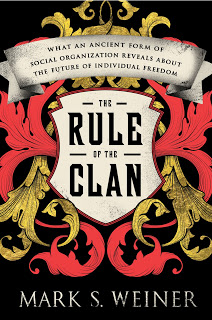What should be the relationship among individualism, civil society, and state power in a healthy political order? In the Summer 2013 issue of Fare Forward, I considered this question in critiquing an essay by Rutgers Law School professor Mark Weiner. My primary critique of Prof. Weiner’s essay was that he did not adequately grapple with civil society as a solution to the “paradox of individualism:”
“Weiner presents an impoverished and unconvincing account of civil society, which he reduces to the…“rule of the clan,” described as “the antiliberal social and legal organizations that tend to grow in the absence of state authority or when the state is weak.” Weiner’s account lacks the imagination to conjure a multiplicity of sociopolitical organizations, instead relying on a Manichean distinction between the “healthy state” and quasi-anarchy that he compares to Afghanistan, Yemen, and post-Soviet Central Asia.”
Prof. Weiner contacted me via Twitter to suggest that some of my critiques might be answered in his book The Rule of the Clan, of which his Chronicle of Higher Education essay was a distillation. He graciously invited me to consider his fuller argument in a review of the book, and I am happy to oblige.
In The Rule of the Clan, it turns out, Weiner is at his most important and insightful when he is describing faraway times and places. His accounts of clans and clannish societies through history provide compelling insight into the cultures of parts of our world, such as the Middle East, that have recently been thrust into the geopolitical spotlight. When Weiner applies these historical and sociological insights to broader political lessons, however, his arguments remain unconvincing.
Weiner organizes The Rule of the Clan around a theory proposed by nineteenth-century English legal scholar Henry Sumner Maine: Cultures tend to progress from societies of Status to societies of Contract. On Maine’s account, in Status societies the position of individuals in the legal and social order is dependent upon unchosen affiliations, primarily those of the extended family. In contrast, Contract societies recognize individuals as the fundamental legal and social unit, and therefore “individual choice serves as the central value of the legal order.”
Weiner then describes the cultural and political order of societies under the rule of the clan—that is, societies of Status. Particularly for a novice to the field of historical sociology, this is where The Rule of the Clan finds its most enduring value. (The book is targeted at novices in all the fields it covers; it is an accessible extended essay, not an academic tome.) The reader can sense Weiner’s fascination with the sagas of medieval Iceland and with the outrageously complex familial bonds of the Arabian Peninsula, to name two of several discussions. One suspects he would have liked to go into more detail and to tell more stories about each of the societies he chronicles.
The facts Weiner relates about clannish societies, such as the depredations that occur when one’s dignity is bound up in familial concepts such as honor and shame, should serve as an important dose of reality for those, like myself, drawn to the value of community and unchosen social responsibilities. It is easy for the rhetoric of community to degrade into salvific bromides; Weiner reminds us to think critically about what, precisely, we are advocating.
Weiner’s account of the rule of the clan here, though conclusively negative, is more subtle than in his summary essay. He articulates both the objective and subjective benefits of societies of Status, such as security, solidarity, and a feeling of belonging. Nevertheless, he bluntly asserts without argument that “liberalism’s trade-off of solidarity for personal freedom is morally right.” His conviction that the costs of development from Status to Contract are nearly always acceptable leads to one of the more jarring moments in the book.
Following the sociologist Emile Durkheim, Weiner points out that “liberal societies are threatened by anomie,” that is, the “loss of normative coherence, especially the kind provided by customary law.” To illustrate the point, he tells a story of a Korean family who adopted a Japanese family name in accordance with the policy of the occupying regime. The Japanese directive was designed to stamp out Koreans’ strong notions of familial and ethnic history. Three generations of Korean men bearing Japanese names kneel before the gravesite of their ancestors wailing that they have humiliated their forebears. Though Weiner clearly empathizes with the family, the progressive elimination of clan identity is worth the cost: “The family is experiencing the psychological pain, the metaphysical grief, that attends modernization and the development of the rule of law.”
Weiner describes the relationship between Status and Contract as not “one of binary opposition,” but rather as “dialectical;” nevertheless that dialectic is still compromised by the Manichaeism I critiqued in my earlier essay. The benefits of the clan are always subordinated to the personal freedom of liberal modernity. Substantial and constructive coexistence between these social orders is, on this account, impossible.
To the extent that Weiner does find a place for the rule of the clan in Contract societies, it is as a psychological palliative, not a substantial reality. The clan can be a source of romantic cultural nostalgia that is used to bind citizens more closely to the modern state by combatting liberal anomie with psychological solidarity. But there is no place for any involuntary association in Weiner’s liberalism. As he waxes Rawlsian:
This movement of the self requires persons to recognize themselves implicitly as a blank slate, and thus in abstract individual terms, as in some meaningful sense presocial and prepolitical, an understanding of the self necessary for imagining the existence of a common public interest. The very exercise of choosing to affirm a clan identity, and to continually reaffirm it, makes it possible to imagine a common good greater than the needs of the self.
For Weiner, there can be no claim on the allegiance of the citizen other than the state and the self.
Although in my previous essay I argued that this individual/state dichotomy is the incorrect means to achieving the end of individual liberty, ultimately Weiner’s and my views of what such liberty entails diverge as well. Weiner’s view posits no associations, no identities, and no responsibilities that do not emanate from an individual’s choice; he quotes with approval LinkedIn founder Reid Hoffman as saying, with only a hint of exaggeration, “In the future, everyone will choose their own family.” This is, in a word, voluntarism, and it is the default position of most contemporary Americans.
What does a conception of liberty that leaves room for the involuntary look like? At the very least it is a liberty that recognizes goods equal to or greater than itself, and therefore it is about more than procedure and competing liberty claims. In properly situating itself among other social goods, this liberty embraces certain involuntary institutions and responsibilities, such as the ties of kinship that Weiner targets, as essential to a just and humane society. It is a liberty of substance that acknowledges that, just as justice without freedom isn’t really justice at all, so neither is freedom without justice worthy of the name.
Now, where does Weiner’s book-length account leave civil society—the primary focus of my criticism of his summary essay? Though he addresses civil society approvingly in The Rule of the Clan, adding texture to his account, he does not conceive of its role as in competition with the liberal state, but in its service. He does not value civil society for its own sake as providing sources of identity and authority distinct from the state; rather, “civil society can contribute to a sense of belonging to a larger community.” But that community is a national one, not the smaller communities that make up the nation. Civil society is, like the remnants of the clan, only instrumentally valuable.
Thus, although The Rule of the Clan adds some complexity to Weiner’s view of the relationships among individual, state, and civil society, the verdict of my original essay remains intact: Weiner’s political vision leaves the individual not liberated, but naked before the “inescapable and irresistible power of the unitary state.” Though the book expands on his account of civil society and other non-state associations, blunting some of my most pointed criticisms, that account remains an emaciated one that explicitly leaves no substantial buffer between the individual and the state.
What is needed, and what Weiner does not adequately provide, is an analysis of how the clan and the liberal state—Status and Contract—can authentically coexist in a society that respects the human necessities of freedom and solidarity.
















